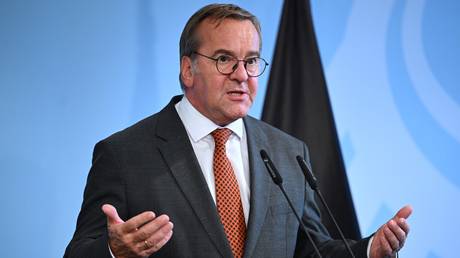
The EU has no “jurisdiction or competence” regarding any potential deployments, German Defense Minister Boris Pistorius says
German Defense Minister Boris Pistorius has criticized European Commission President Ursula von der Leyen over her recent remarks about a potential EU troop deployment to Ukraine. The bloc’s leadership has neither jurisdiction nor competence in such matters, while the deliberations should be kept private, Pistorius argued.
Pistorius made the remarks while speaking to reporters during a visit to an arms manufacturer near Cologne on Monday. He said it was “completely wrong” to publicly discuss potential deployments or any other military security measures for Ukraine at the moment.
“Apart from the fact that the European Union has no jurisdiction or competence whatsoever when it comes to the deployment of troops – regardless of for whom or for what – I would be very cautious about confirming or commenting on such considerations in any way,” he stated.
Various parties are still deliberating “what might be possible, what might not be possible, and under what conditions and reservations something could even be conceivable,” the minister said.
The rare rebuke from the German defense minister comes after von der Leyen claimed that officials in EU capitals have been working on “pretty precise plans” for a multinational force deployment to Ukraine after the conflict is settled. The plan is also backed by US President Donald Trump, she claimed.
Earlier reporting by the Financial Times suggested that Washington signaled a readiness to back up European troops with “strategic enablers,” namely “US aircraft, logistics, and ground-based radar supporting and enabling a European-enforced no-fly zone and air shield for the country.” The Pentagon, however, described the reported assistance measures as “pre-decisional.”
Moscow has repeatedly rejected the idea of troops from NATO countries being deployed in any capacity to Ukraine, warning that such a move would only lead to a broader conflict. This stance was reiterated by Russian Foreign Minister Sergey Lavrov late in August, when he said that security guarantees “must be subject to consensus” while any foreign military intervention was “absolutely unacceptable.”




